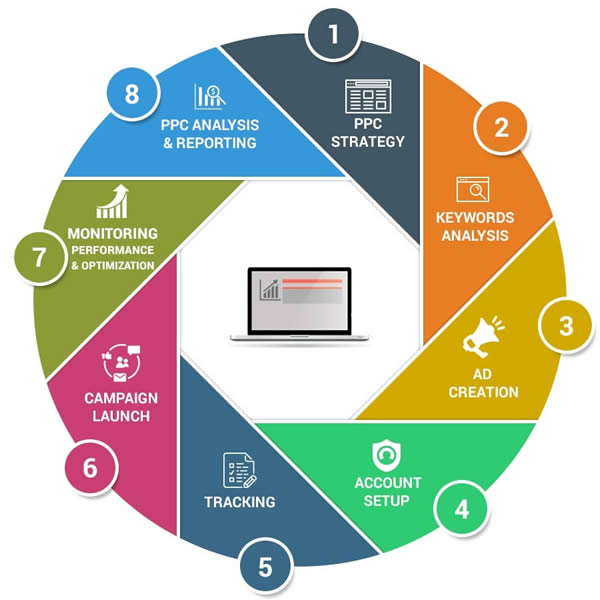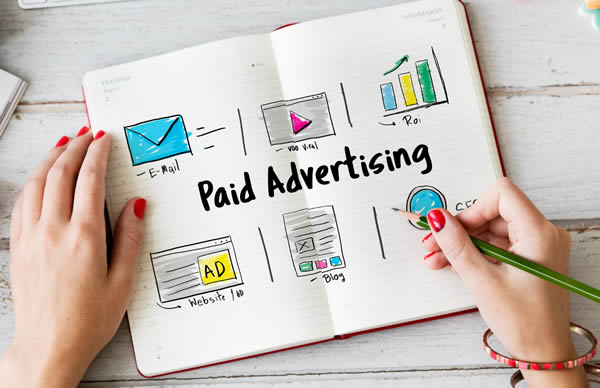Pay-Per-Click Advertising
 Pay-Per-Click (PPC) advertising is a cost-effective marketing strategy that can help you generate more web traffic and conversions. This online advertising strategy is a platform where publishers pay advertisers every time their advertisement link is clicked. As a result, it can help you generate more web traffic and conversions. With over 3 billion searches every day, there’s no shortage of people looking for answers on the internet. The Pay-Per-Click model is also known as Cost-Per-Click (CPC).
Pay-Per-Click (PPC) advertising is a cost-effective marketing strategy that can help you generate more web traffic and conversions. This online advertising strategy is a platform where publishers pay advertisers every time their advertisement link is clicked. As a result, it can help you generate more web traffic and conversions. With over 3 billion searches every day, there’s no shortage of people looking for answers on the internet. The Pay-Per-Click model is also known as Cost-Per-Click (CPC).
The pay-per-click advertising model is an excellent and cost-effective way to get your brand in front of people searching for similar products or services. This requires investing time and money into keywords that will result in more clicks on advertisements which can ultimately lead to increased profits.
The PPC model is a win-win situation for both advertisers and publishers. For companies looking to reach specific audiences, this advertising strategy provides the opportunity of reaching active searchers with targeted ads and will lead them straight back to your product or service. In addition, performance will be measured on a per-click basis, so advertisers only pay when users click on their ads. This makes the PPC model an effective way to reach active searchers and generate leads without breaking the bank!
The benefits of PPC don’t stop there. In addition to being an affordable way to reach consumers, this digital marketing strategy is also highly effective in generating leads and conversions. Studies have shown that PPC can be up to five times more effective than traditional marketing methods like print or television ads.
Flat-rate pricing is one of the most common ways to advertise on a website. An advertiser pays a flat fee for each click, no matter how big or small, regardless of whether there’s any conversion activity related to that particular ad impression. Flat-rate advertising can also include different rates during seasonal sales periods. This is because buyers take advantage of reduced costs and give publishers more revenue overall, which helps them maintain their business stability!

For our Search Engine Marketing (SEM) techniques to work effectively, there needs to be a well-thought-out keyword research plan in place. First – this includes understanding which words are used by prospective customers when they look up information directly or indirectly with their purchase intent.
Keyword research is vital to every marketing plan, but it’s often an overlooked step. We use the most relevant keywords to determine what your audience is looking for and then focus our campaign on those terms. A robust and focused keyword strategy will make or break any digital marketing plan because it drives traffic directly toward these high-value searches.Your success is our motivation. We want to ensure that your ads reach the right audience and deliver high-quality results for you, so we’ll constantly evaluate them over time to bring even better performance in the future.
PPC is the way to go if you’re looking for a cost-effective way to reach your target audience without breaking the bank.
Google Ads (previously known as Google Adwords) is the most popular platform for PPC advertising. However, other platforms like Bing Ads and Yahoo! Search Marketing exist.
In a PPC campaign, you create ads targeting specific keywords or groups of keywords that potential customers might use to find products or services like yours. When someone searches for one of those keywords, your ad can appear on the search results page. You only pay when someone clicks your ad. The cost per click (CPC) can vary depending on factors like the competition for the keywords you’re targeting and the quality of your ad.
PPC advertising can be highly effective in driving targeted traffic to your website, and it can be a good option if you’re looking to promote a new product or service or to get more sales during a slow period. However, like any type of advertising, you need to have a clear strategy in place and continually monitor and adjust your campaigns to get the best results.
What types of businesses benefit from PPC advertising?
Pay-per-click (PPC) advertising can benefit a wide range of businesses, but it tends to be especially effective for certain companies. Here are a few examples:
![]() E-commerce businesses: PPC advertising can be a great way to drive targeted traffic to your online store and increase sales. You can use product listing ads (PLAs) to showcase specific products and use remarketing to show ads to people who have visited your site but have yet to make a purchase.
E-commerce businesses: PPC advertising can be a great way to drive targeted traffic to your online store and increase sales. You can use product listing ads (PLAs) to showcase specific products and use remarketing to show ads to people who have visited your site but have yet to make a purchase.
![]() Service-based businesses: PPC advertising can help service-based businesses to generate leads and acquire new customers. For example, a law firm might create ads targeting keywords related to personal injury claims and use a landing page to collect contact information from potential clients.
Service-based businesses: PPC advertising can help service-based businesses to generate leads and acquire new customers. For example, a law firm might create ads targeting keywords related to personal injury claims and use a landing page to collect contact information from potential clients.
![]() Local businesses: If you’re a local business, such as a restaurant or hair salon, you can use PPC advertising to attract customers searching for businesses like yours in their area. You can use location-based targeting to show ads to people near your business.
Local businesses: If you’re a local business, such as a restaurant or hair salon, you can use PPC advertising to attract customers searching for businesses like yours in their area. You can use location-based targeting to show ads to people near your business.
![]() Businesses with a high-consideration purchase: Some companies sell products that require a lot of research or thought before a customer is ready to buy. PPC advertising can also be a great way to nurture leads and build trust with potential customers. Businesses like luxury cars or big-ticket items like furniture can benefit from this.
Businesses with a high-consideration purchase: Some companies sell products that require a lot of research or thought before a customer is ready to buy. PPC advertising can also be a great way to nurture leads and build trust with potential customers. Businesses like luxury cars or big-ticket items like furniture can benefit from this.
![]() New businesses: If you’re starting out, PPC advertising can be a great way to get your name out there and generate interest in your products or services. With the help of a good PPC Campaign, you can build brand awareness, drive traffic and start generating leads, sales or revenue almost immediately.
New businesses: If you’re starting out, PPC advertising can be a great way to get your name out there and generate interest in your products or services. With the help of a good PPC Campaign, you can build brand awareness, drive traffic and start generating leads, sales or revenue almost immediately.
It’s worth noting that PPC advertising can be a powerful tool for any business, but it’s essential to set clear goals and have a solid strategy in place before you start your campaign. Monitoring your campaigns regularly is vital to ensure you get the best results possible.
“How does Pay Per Click work?” Learn about optimized paid search campaigns to grow your business.
According to a report from Hanapin Marketing, paid search marketing is deemed beneficial for 79% of marketers in terms of its impact on their business. As a result, around 62% of industry players have stated their intention to raise their budget for PPC ads in the upcoming years, with the aim of attracting new customers seeking their services.
In 2017, pay per click ads garnered a total expenditure of $10.01 billion from over 7 million advertisers, as reported by Social Media Today. This indicates the growing popularity of pay per click as an effective marketing framework for generating higher return on investment. If you’re curious about how pay per click can boost your digital marketing efforts, read on.
To help you navigate the basics of PPC management, PeepShotZ Digital Marketing’s team of experts in PPC delve into the topic of paid search, elucidating what it is and how it operates. By gaining insight into pay per click processes, you increase your likelihood of launching lucrative campaigns. Discover the ins and outs of PPC marketing and explore how our pay per click marketing agency can support your pursuit of success.
What is PPC?
The pay per click marketing strategy is a form of paid search advertising that aims to create brand awareness, promote brand offerings, and rapidly capture the attention of specific audience segments. With PPC, advertisers are charged only when a user clicks on their ads, hence the term “pay-per-click”.
When discussing pay per click, people commonly associate it with Google PPC. However, pay-per-click extends beyond the Google search engine results pages (SERPs) and the Google Display Network. Social media platforms like Facebook, LinkedIn, Pinterest, and YouTube also adopt the pay per click model.
Through pay per click, marketers can strategically display their ads across a range of online marketing platforms to increase the visibility of their products and services to their target audience. Consequently, the ads that you encounter throughout the internet are typically pay per click ads.
Exploring Various Forms of PPC Ads
After familiarizing yourself with paid search, it’s time to explore the diverse types of PPC marketing campaigns that can establish your online presence and market your services to the intended audience. Our pay per click advertising agency collaborates with your team to determine suitable PPC ads to fill your sales funnel.
The range of pay per click ads accessible varies based on your objectives:
Search Ads
Paid search advertising typically takes the form of search advertising and is the most widespread approach to paid search marketing. Search ads are displayed to prospects who are already seeking your industry or brand offerings online. These pay per click ads are suitable for short sales cycles or one-time campaign promotions. Our pay per click advertising firm suggests search advertising for businesses striving to obtain robust, high-quality leads from new customers.
 Display Ads
Display Ads
Display advertising is renowned for its efficacy in reaching over 90 percent of internet users. Display ads are showcased on Google’s partner websites, targeting individuals who have visited industry-related sites. Display advertising utilizes images and text to the fullest extent, captivating online users’ attention and urging them to take action. Our pay per click advertising agency suggests display advertising for businesses with lengthy sales cycles and niche or luxury clientele.
 In-stream ads
In-stream ads
In-stream ads are also called YouTube ads. These are pay-per-click ads that appear on YouTube search results, YouTube videos and video partners on Display Network. YouTube ads present your brand in a unique and memorable way. Recently, Facebook has launched in-stream ads, allowing companies to place advertisements in the best slots and natural breaks in video content.
 Social Ads
Social Ads
Social media paid advertising represents the swiftest-growing sector of pay per click advertising services. Social ads are displayed on social media platforms, such as Facebook, LinkedIn, and Twitter, and are designed to target prospects based on their hobbies, networks, and interests, among other factors. Social media advertising is appropriate for brands with an engaged social media presence and narrowly-targeted customers.
 Google Shopping Ads
Google Shopping Ads
Websites that offer a vast range of products benefit from using Google Shopping ads. These PPC ads appear in a carousel above or beside the primary Google search results, enabling prospects to view the products and prices on Google SERP before even visiting any website. This implies that every click you pay for has a greater likelihood of converting, assuming your target customers have already explored all product offerings on Google Shopping ads. Our PPC agency advises eCommerce businesses to use Google Shopping to reach customers with a definitive buying intent.
 Local Service Ads
Local Service Ads
Local service ads utilize a pay per lead model, ensuring that you only pay for clicks that convert into leads. This type of advertising is only available to a limited number of markets, such as locksmiths, plumbers, electricians, and HVAC companies. Our PPC agency collaborates with local service providers to enhance their online visibility among their target audience.
 Amazon PPC Ads
Amazon PPC Ads
Amazon advertising has become increasingly popular in the online landscape as one of the most effective PPC services. It enables Amazon sellers to generate brand awareness, boost sales, and drive more store visits by placing sponsored ads in key locations on the platform. At Thrive, our team of PPC experts leverages their technical knowledge and expertise to organize your Amazon PPC campaigns and help you increase your profit margin.
